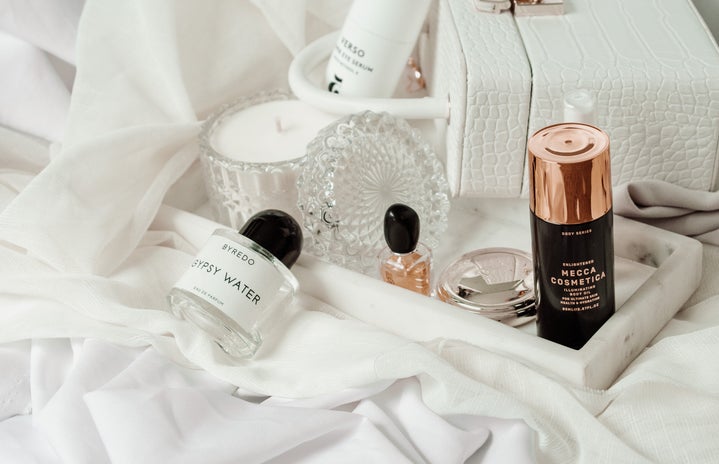Photoshop. This term evokes so many contradictory emotions in all of us. We love it; yet we hate it. We use it on ourselves, but critique the ones who do it as well.
It has such a strong presence in our society that it is hard to believe we could erase it entirely from our daily lives.
Every single day, we view an ample amount of photoshopped pictures that influence our perspective of reality and what beauty really is. Even though we know deep down the pictures are altered, we are unaware of the magnitude of these changes.
We are slightly aware of the type of changes that could be applied to the ads, but we still believe we could look the way the photoshopped models do. The pressure on girls is becoming more intense, breaking the self-esteem of so many. ‘They just have to be stronger’ some say. But do we really need to pass through this excruciating period of criticism and hatred for ourselves? Our mothers certainly did not have to live up to such high, unrealistic, expectations.
Nowadays, our children who are as young as 6 years of age are now suffering from anorexia. Normal? I don’t think so. Some are trying to change the current situation by pressuring important actors in media to publish pictures of real women. Acclaim the majority, not the rare minority.
July 2012, Julia Bluhm’s petition against the editor-in-chief of Seventeen magazine was a victory. The purpose? For them to publish an unaltered photo spread per month. Gaining a total of 86 439 signature, this petition made quite a commotion in the fashion industry. Voices were being heard and fortunately, Seventeen accepted. Though they keep insisting on the fact that they never did do such photoshopping, they promise to ‘never change girls’ body or face shapes’. Furthermore, Seventeen partnered with the National Eating Disorders Association as well as the Commission for Positive Images of Women and Girls.
After this success, Carina Cruz and Emma Stydahar from New York started a petition against Teen Vogue. Gaining 50 641 signatures, but without any cooperation from the magazine. In fact, Amy Astley, the editor-in-chief stated to the girls who started the petition that they did not know what they were talking about and ‘to go do [their] homework’. After this failure, they started a new petition once again, but instead they aimed the advertisers, like Neutrogena, Tampax and Clean&Clear. They asked them to not advertise in Teen Vogue until the magazine would agree to portray real girls. Being their biggest advertisers, they were hoping this would of put enough pressure on the magazine to change its ways. The petition gained 11 993 signature, but with no success.
However, Glamour magazine was one step ahead of Seventeen magazine, February 2012, by saying they will not change models’ shape and they will also leave freckles and scars that make each women unique.
When talking to photographers, a recurring fear that kept being brought up was that banning alterations in ads would actually put a lot more pressure on models to have better, thinner bodies. The industry will probably become more critical of how they choose their models, making it more demanding since some flaws will not be tolerated anymore. Because models will not be able to rely on photoshop, they will need to try to obtain the photoshop look instead. Therefore, instead of promoting a healthier image for readers, more models will suffer from anorexia, without any real modifications in the look of models in ads.
In 2006, two Latin American models died because of eating disorders. Consequently, Italy’s fashion industry and its government created a voluntary code of conduct, which promotes the use of models who are over the age of 16 and who are not underweight. Underweight meaning their body mass index (BMI) is lower than 18.5. Though there are no sanctions attached to it, those who do use underweight models would not be invited to major fashion events. Whereas in Spain, they did not accept models to be part of Madrid’s fashion week if their BMI was under 18.
Countries have taken action to try to limit the use of underweight models in the fashion industry and these efforts are still undergoing. March 2012, Israël went further by passing a law banning models who have a BMI under 18.5, so models need to be certified by a doctor when working. Also, since ads are not suppose to feature underweight models, it will need to inform if the model’s body was altered.
Though I do believe it is a good initiative from the governments, the issue might be addressed the wrong way. The body max index does not necessarily indicate that someone is healthy. In fact, girls who are anorexic could be over the 18.5 BMI and actually be aiming it. Like some people who are naturally overweight, some can be under that BMI without trying to. Myself for example, I am active, healthy and I religiously eat three meals a day. However, my BMI is 18.2. It is unfair towards girls who are healthy and thin to be discriminated because of their weight as much as heavy girls. This brings up a new issue that everybody with any type of body should be featured. Therefore, even though we are taking revolutionary steps towards a healthier body image in media, we should not take measures that discriminate those who are very thin like we are currently doing with plus size girls.
Many believed Photoshop was a tool for creativity from the moment it became popular during the 90’s. Photoshopping is not only about modifying the structure of a body, but also the saturation, the texture and the lighting of the picture. Instagram is a way of altering a picture. So yes, you have been photoshopping your food!
The photographer Simon Duhamel is an avid believer in Photoshop. In 2009, when France was thinking about legislating the use of Photoshop by passing a French bill, Simon Duhamel posted on his blog some interesting comments. The title being ‘A law against Photoshop… gimme a break!’ clearly indicates his position on the matter. He believes it is a joke to have to identify pictures that have been altered in publications. ‘[P]hotography is an interpretation of reality, not it’s perfect representation […]People don’t need babysitting, they need to take responsibility for their own actions!’
It is true we cannot blame every insecurity a woman has on media, however we cannot exonerate it from the problem. We have to come to terms with the fact that altered pictures will never be eliminated from our society, however we can and need to define limits as to what is too much.
Until then, women need to stay educated and aware of the difference between reality and idealistic beauty. Girls have to be told from the moment they learn to talk that beauty is not in media, but within themselves. There is no ideal, there is only us.
On that note, I leave you with this very funny and eye opening parody on Photoshop by Adobe!
http://www.youtube.com/watch?v…
Bibliography:
About the different petitions:
http://www.change.org/petitions/seventeen-magazine-give-girls-images-of-real-girls
http://www.change.org/petitions/teen-vogue-give-us-images-of-real-girls
http://www.change.org/petitions/neutrogena-tampax-and-clean-clear-stand-with-teen-girls
http://www.cnn.com/2012/07/05/us/seventeen-photoshopping/index.html
http://www.glamour.com/health-fitness/blogs/vitamin-g/2012/02/you-tell-us-how-should-glamour.html
About the different laws/regulations:
http://www.bbc.co.uk/news/world-middle-east-17450275
http://news.bbc.co.uk/2/hi/europe/6204865.stm
http://www.simonduhamel.com/blog/?p=1109
Links to pictures:
http://favim.com/orig/201107/0…
Naomi watts: http://www.elistmania.com/still/20_female_celebrities_before_after_photoshop/
Photshop2: http://forums.overclockers.com.au/showthread.php?t=365833
Media+bodyimage: http://www.ourworldtoday.com.au/news/article/picture-not-perfect
Seventeen treaty: http://www.celebitchy.com/category/photoshop/
Karlie Kloss photoshop: http://www.catwalkqueen.tv/2012/09/numero_magazine.html
Photoshop-art: http://www.photoshopcreative.co.uk/image/20283/beauty_vs_time

